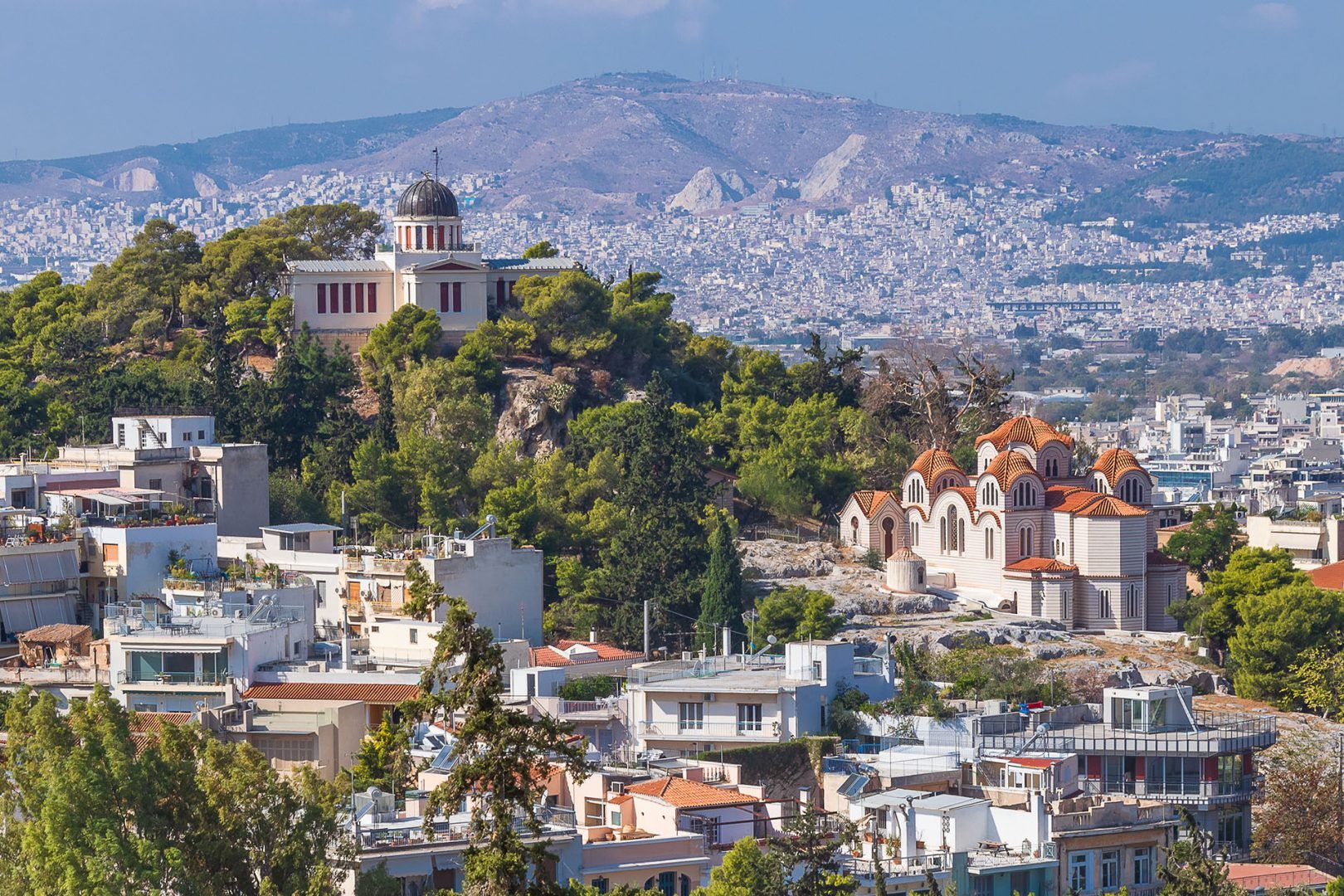Travel advice for Greece
From travel safety to visa requirements, discover the best tips for visiting Greece
Book your individual trip, stress-free with local travel experts
Greece looks easy on the surface – sun, sea, ruins – but first-timers still slip up. Most trips start in Athens: loud, gritty, and full of ancient swagger. But don’t stop there. Ride north to Meteora’s cliff-top monasteries, go west for slow island vibes in the Ionian, or ferry through the Cyclades chasing grilled octopus and sea views. English gets you far, but don’t expect signs to help in small towns. And Greek food? It’s not just moussaka – think bakery pies, charcoal-grilled meats, and just-caught fish. These Greece travel tips will help you skip the crowds, eat well, and travel smarter from the start.
The best time to visit Greece depends on what you’re after. This is a country that runs on late lunches, slow ferries, and blazing sun – and the seasons shape everything. Whether you're here for island hopping, mountain hikes, or ancient ruins, timing makes a difference. Here’s what to know.
Greece can be surprisingly affordable – but only if you know where to spend and where to save. Prices shoot up fast in tourist magnets like Santorini, Mykonos, and the center of Athens. But head to less-hyped islands or inland towns, and your euros stretch a lot further.
The basics are still good value. You can grab a fresh spanakopita and coffee for under €3, or sit down to a proper taverna meal – think grilled meat, salad, and house wine – for around €12-15. Public transport is cheap and reliable, especially in cities, and ferries are reasonably priced if you book in advance. Entry to major ruins and museums usually ranges from €6-12, with discounted combo tickets in Athens and Thessaloniki.
If you're traveling on a tight budget (€50-70 a day), you’ll manage just fine by staying in hostels or simple guesthouses, eating local, and using buses or ferries. Go off-season, and prices drop even more.
Mid-range (€90-140) gets you boutique hotels, car rental, guided tours, and a few splurges on seafood or wine tasting.
If you’re spending big, Greece delivers: sunset dinners on a private terrace, cliffside suites with caldera views, island-hopping yachts. It’s not cheap, but it often feels worth it – especially compared to other Mediterranean hotspots.

Monastery in Metéora, Greece - a peak springtime experience © Shutterstock
Yes – Greece is generally a very safe country to visit. Crime rates are low, locals are friendly, and solo travel (including for women) is common and mostly hassle-free. You’ll see it in everyday life: people leave bags on chairs at cafés, kids play outside late, and strangers won’t hesitate to help with directions.
Petty theft is your main concern, especially in busy areas of Athens or on packed ferries. Pickpockets target metro lines, tourist hotspots like Monastiraki and Omonia squares, and crowded beaches during high season. They’re fast, quiet, and usually after phones or wallets.
Smaller towns and islands feel even safer – slower pace, fewer crowds, and a strong sense of community. Whether you’re in a mountain village in the Peloponnese or a beach town on Naxos, you’ll likely feel more watched over than targeted.
To stay safe, keep these Greece travel tips in mind:
For most travelers, no. Greece is part of the Schengen Zone, which means easy entry for citizens of the EU, UK, US, Canada, Australia, and many other countries. But don’t assume you’re covered – here’s what you need to know.
If you’re from a visa-exempt country, you can enter Greece for up to 90 days within any 180-day period for tourism. You’ll need a passport valid for at least three months beyond your planned departure. There’s no visa paperwork – just a stamp on arrival.
That’s where it gets complicated. You can’t legally extend a short-stay tourist visit beyond the 90 days unless you apply for a national visa – which must be done before you arrive.
Some travelers try bouncing to nearby countries like Albania or Turkey to “reset” the clock, but Schengen rules don’t work like that. Overstaying can lead to fines, deportation, or travel bans.
You’ll need the right visa in advance. Tourist entry doesn’t cover anything beyond holiday-level plans, and Greek bureaucracy moves slowly – start early if you're applying for a long-term stay.

Ancient Theatre of Epidaurus, Peloponnese - where classics came to life © Shutterstock
Staying healthy in Greece is usually easy, with clean water, solid food hygiene, and reliable medical care across the country. You’re not dodging dodgy tap water or mystery meat here. That said, don’t underestimate the Greek elements: serious sun, steep stairs, and more fried cheese than your digestive system might be ready for. A bit of prep and common sense go a long way.
Healthcare in Greece is decent, especially in major cities like Athens and Thessaloniki. Pharmacies (look for the green cross) are easy to find and often double as mini clinics – pharmacists are well-trained and can usually handle basic issues without a doctor. Many speak English.
For emergencies, head to a hospital or private clinic. Public ones are free or low-cost but can involve long waits. Private clinics are faster but pricier – travel insurance is a must if you want stress-free care.
What to bring:
No special vaccines required. Just make sure your standard shots – tetanus, measles, hepatitis A – are up to date.
Tap water is safe in most of Greece, including Athens, Thessaloniki, and many of the bigger islands. Some smaller islands use desalinated or delivered water, so locals often go for bottled water. Ask around before drinking from the tap.
Greek food is one of the best parts of traveling here – fresh ingredients, bold flavors, and plenty of variety. Grilled meats, seafood, stuffed vegetables, and flaky pastries are usually safe to eat, even in small tavernas or street spots. If you’ve got a sensitive stomach, take it slow. Dishes can be rich, oily, or heavy on cheese, and Greek food doesn’t do mild.

Assos village in Kefalonia island - Captain Corelli territory © leoks/Shutterstock
Greece is laid-back, but there’s an unspoken code: be polite, show respect, and don’t mistake casual for careless. A little effort goes a long way with locals.

With a few words in your lexicon, you'll be ordering boukáli krasí in no time. Santorini wine and island image © Shutterstock
Absolutely – if your family trip wishlist includes ancient ruins, beach days, island ferries, and plenty of food, even picky eaters will love it. Greece with kids is surprisingly easy: it’s welcoming, safe, and full of low-key adventures. You won’t find big theme parks, but you will find castles to climb, myth-filled ruins to explore, and boat rides that double as sightseeing.
In cities, metros and buses are reliable, but busy. Ferries are fun, but long rides can test younger kids – choose shorter hops or splurge on a cabin. A rental car is handy on the mainland or larger islands like Crete.
Strollers work in some places, but not on cobbles, steps, or ruins. A baby carrier is a smart backup.
Family-friendly accommodation in Greece is easy to find – apartments, guesthouses, beach resorts, or rural stays (agrotourismos). Many places offer cribs, kitchens, or adjoining rooms – just ask in advance.
Greek food is made for families: grilled meats, fries, bread, cheese pies, and lots of sharing. No kids’ menus, but portions are huge and the staff are happy to split or adjust dishes. Tavernas are casual, and kids are always welcome, even late.
Supermarkets and pharmacies are well stocked with diapers, formula, and baby food – though in smaller villages, it’s smart to plan ahead.
High chairs are common in mid-range tavernas, less so in tiny local joints. And yes, someone will probably sneak your kid a piece of cake or a free juice – Greeks love kids.

Stunning Sarakiniko beach on Milos, Greece © Shutterstock
Greece isn’t just ruins and beaches – it’s mountain villages, island ferries, volcanic craters, and cities that never sleep. From ancient temples to off-grid coves, these are the best places to visit in Greece – and why they’re worth your time.

Paxos, the smallest group in Greece's Ionian Islands © Shutterstock/Heracles Kritikos
Greece might look like a quick hop between ruins and islands, but don’t let the size fool you. Ferries, mountains, and slow meals stretch the pace. You can hit some of the best things to do in Greece in a week – the Acropolis, a beach or two, maybe Meteora – but the real magic kicks in when you slow down.
How long you stay shapes the trip. Try to cram in too much, and you’ll miss the point. That’s a rookie mistake. Greece rewards time to linger over lunch, to detour down a back road, or to watch the light change on a temple stone.
Ask yourself:

The iconic blue-domed churches of Oia, Santorini © Shutterstock
Planning a trip to Greece isn’t about hitting every ancient site or ticking off islands like a checklist. It’s about choosing the right mix – history, beaches, slow meals – and leaving space to wander. The best Greece itinerary doesn’t rush. It moves with the ferry schedule, the village rhythm, and the late-night dinners. Less is more.
Greece is spread out – mountains, islands, ruins – but it’s manageable if you don’t overpack your schedule. Here’s how time shapes your trip:
Greece has layers. Match your route to what you’re actually into, not what the tour books say.
History + cities
Landscapes
Islands
Food + wine
Relaxing
Getting around Greece takes a bit of planning – but it’s part of the adventure. Ferries link the islands, but they don’t always match up with your ideal schedule. In high season, book early to avoid getting stuck.
Trains are limited, so buses and rental cars are better bets on the mainland. Roads are in good shape, but expect hairpin turns, mountain routes, and tight squeezes in old villages. If you’re not into manual gearshifts, reserve an automatic well in advance.
Flights can save you serious time for longer distances, like Athens to Crete, Rhodes, or Lesvos. Book ahead, especially in summer.
Taxis and ride apps like Free Now work well in cities. But once you leave urban areas, you’ll want your own wheels. Getting around Greece is easier when you can go at your own pace, especially in remote villages, archaeological sites, or hidden beaches that buses don’t reach.

Get your glow on - a (typical) stunning Santorini sunset © Shutterstock
Greece was made for slow travel – ferries that take their time, meals that stretch into sunset, and places where the clock doesn’t matter. Skip the bucket list and settle in.
In Athens, pick a local neighborhood like Koukaki or Mets. Walk to your morning bakery. Visit the ruins in the late afternoon. Sit at a café in a shady square and do absolutely nothing. Watch the city breathe.
The Peloponnese is perfect for slow road trips. Stay in Nafplio or a village in the Mani. Drive winding roads past olive groves and stone towers. Stop when you feel like it. Eat where the locals eat.
On the Greek islands, base yourself somewhere with rhythm. In Naxos, stay in a small village and take the bus to the beach. In Ikaria, time is flexible – dinners start late, and no one’s in a hurry. On Sifnos, you’ll spend days doing little more than swimming, snacking, and walking between sleepy villages.
In Crete, pick a base in the west like Chania or Paleochora. Explore slowly – gorges, beaches, mountain plateaus – and stay in family-run places where breakfast is still homemade.
Tips for slowing down

The Acropolis resplendent at sunset © Shutterstock
Greece keeps things fairly straightforward, but a little know-how goes a long way – especially when a taverna tells you it’s “cash only” after the meal.
The currency is the euro (€), and cards are widely accepted in cities, islands, and larger towns. Visa and Mastercard are safest. But always carry some cash – especially for rural villages, small bakeries, kiosks, or beach tavernas where the Wi-Fi (and card machine) may or may not work.
Always choose to pay in euros, not your home currency, when using a foreign card. Dynamic currency conversion sounds helpful, but it’s always the worst deal.

Picturesque Plaka in Athens © Shutterstock
Greece is generally safe and laid-back, but tourist areas still attract a few classic scams. Most are small-time and easy to dodge if you know what to look for.
Greece is warm and welcoming, but that hospitality runs both ways. Responsible travel here means respecting local rhythms, traditions, and the places that make Greece more than just a holiday backdrop. These Greece travel tips will help you do it right.

Caryatids at the Acropolis, Athens © Shutterstock
Greece gets brutally hot in summer – especially inland or in Athens – but not all accommodations come with air conditioning. Older neoclassical buildings in Athens or Thessaloniki, and traditional homes on islands like Hydra, Ikaria, or the Mani, often rely on thick stone walls and ceiling fans. On islands with narrow power grids, like Kythira or Amorgos, AC may be limited to evenings. If you’re traveling from June to September, check before you book. Coastal breezes are great – until they vanish.
While Athens shops might open, villages, mountain towns, and most islands still treat Sunday as a proper day off. Expect bakeries, petrol stations, and supermarkets to close by midday, or not open at all. Planning a Sunday in Zagori, Ikaria, or Tinos? Pack snacks, fuel up early, and pepare to slow down. That said, tavernas will be full of locals out for Sunday lunch, especially in family-run spots.
Greece has some of the best beaches in Europe, but they’re not always gentle. On windy islands like Mykonos, Andros, or Karpathos, strong meltemi winds create rough surf and riptides. Lifeguards are common at big resort beaches, but many of the country’s best spots – remote coves in Crete, the Mani, or the Ionian coast – are unguarded. Greece uses a flag system (green, yellow, red), but not everywhere. If there’s no flag, assume there’s no lifeguard. Locals often know which beaches are safe that day, so ask.

Classical Kerameikos in Athens © Shutterstock
From travel safety to visa requirements, discover the best tips for visiting Greece
Discover Greece's most captivating stories